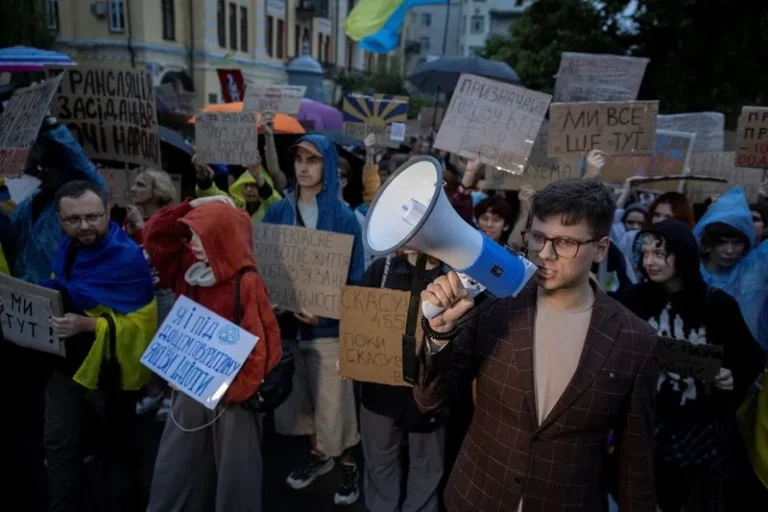Ukrainian lawmakers are set to discuss a bill restoring the independence of the country’s two main anti-corruption agencies. This move aims to ease a political crisis that has shaken public trust in President Volodymyr Zelenskiy’s leadership during wartime.
In recent days, thousands of protesters gathered in Kyiv and other cities, showing rare public frustration. Their anger followed last week’s quick approval of changes that weakened these respected agencies. The amendments, pushed by Zelenskiy’s ruling party, limited the agencies’ powers.
Facing strong backlash, Zelenskiy reversed course. He acted after pressure from European officials, who warned that weakening the anti-corruption bodies could harm Ukraine’s bid to join the European Union. These officials stressed that fighting corruption is a key EU requirement.
Even after Zelenskiy sent a new bill to restore agency independence, protests continued. On Wednesday night, hundreds of people rallied near the presidential administration in Kyiv. They chanted slogans like “Shame!” and “The people are the power!”
Kateryna Kononenko, a 36-year-old protester, said she hopes parliament votes to pass the new bill as quickly as it did the controversial changes last week.
Activists also plan demonstrations near the parliament building on the day of the vote. Their goal is to push lawmakers to approve the restoration bill.
Ending corruption and strengthening the rule of law are seen as vital by Ukrainians. Many view EU membership as essential for the country’s future, especially while it defends against Russia’s invasion.
Last week’s amendments gave the general prosecutor, chosen by Zelenskiy, the power to transfer cases away from anti-corruption agencies and reassign prosecutors. Critics argued this was a way to shield the president’s allies from investigation.
Though the recent protests are smaller than Ukraine’s 2014 Maidan revolution, they have drawn comparisons to that event. The Maidan protests led to the ousting of a president accused of corruption and authoritarian rule.
According to a recent survey by Gradus Research, over two-thirds of Ukrainians support the current demonstrations.
The National Anti-Corruption Bureau of Ukraine (NABU) and the Specialized Anti-Corruption Prosecutor’s Office (SAPO) have played a key role in the fight against corruption since Russia’s invasion began in February 2022. They have charged lawmakers and high-level officials, including a former deputy prime minister accused last month of taking a $345,000 bribe.
Semen Kryvonos, NABU’s chief, told reporters last Friday that pressure on his agency would likely continue. He described corrupt forces as unwilling to see Ukraine’s governance improve.
Kryvonos said the recent protests gave anti-corruption officials a stronger sense of duty. Yet, he urged Ukraine’s leadership to support their efforts fully.
“This responsibility must be shared with the government, which needs to react and say, ‘Okay, there’s corruption here—let’s destroy it,’” Kryvonos said.
The restoration of these agencies’ powers is a crucial step for Ukraine. It signals a commitment to transparency and rule of law that many believe is vital for the country’s future and its relationship with the European Union.







